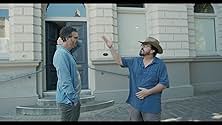In 1977, Michel Foucault - who at the time was France's foremost intellectual - wrote a preface for a book that never materialised. His essay was called "The life of infamous men." The book was to be a collection of excerpts from so-called lettres des cachets - complaints that 18th Century French citizens could submit to the king about the behavior of a relative, spouse, neighbour or acquantance. From his Paris apartment, Foucault spoke about these lives rising up through the centuries. Lives condemned in a few words. Despicable personages. Scriveners. Lecherers. Fantastical usurers.
Foucault admited to being more moved by these characters than by the canonical tomes of official history. In their blasted and blighted lives, he found points of fascination, and one could say more; he appeared to find a wellspring of uncanny understanding, about the human condition, about human life, about the architecture of knowledge and power that envelopes and saturates all of us, and about the straight and narrow line that runs through the decades, and around which human life gathers as it veers toward an unnameable norm.
I was reminded of this essay and Foucault's feeling towards these extra-ordinary figures while watching David Farrier's documentary. It is a glimpse into a substrate of human life that reverberates almost as the mirror opposite of the branded celebrity culture we all know. A substrate of disorder and fanastical absurdity, and that is as colored by malevolence as it is quaint and incredible mundanity.
Lachlan Anderson's soundtrack is perfectly pitched. It captures an emotional landscape that magnifies the question marks thrown open by the film. But what deserves more praise still is the gentle openness of Farrier himself, as a protagonist in this entire work. He seems to share something with Foucault that allows the film to be made at all. Because whereas many might back away from the subject of the documentary, Mr Organ, or respond aggressively to his behavior, Farrier approaches him as something curious and worthy of being known. And yet that does not constitute condoning Mr Organ's apparent actions. So it is less about passing judgment as it is putting into the spotlight one unique and troubled character, and yet letting that character have their say.
What emerges is beyond fascinating. It's a true document that casts light on many things it would be impossible to express in words alone. In the editing, in the camera work, in the narrative, a consciousness about what is so remarkable in this story appears evident. It is this consciousness that deserves recognition. Because there is a humanism here that goes beyond mere gesture. It's real, and it brought something to light that we can all ponder, and probably learn from. What do we learn exactly. There is wonder everywhere, even amid what is distasteful and disturbing. We share this world with multiple worlds, and amid tremendous latent chaos.

















